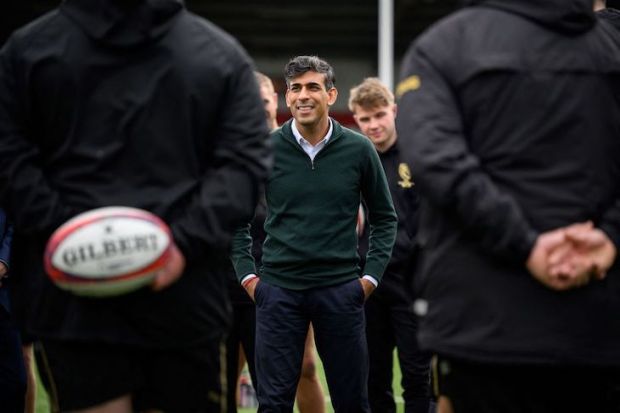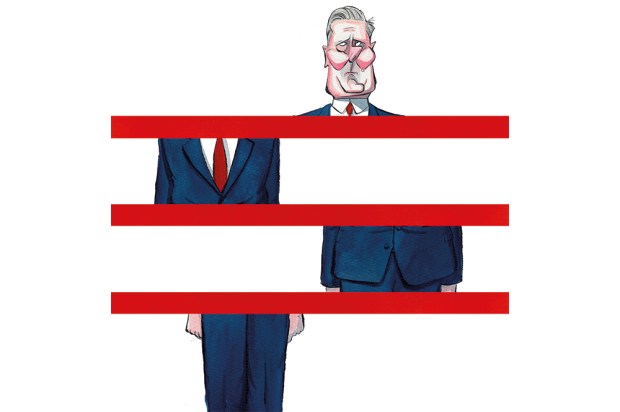Imagine a key that opened the door to a place where children did better at school, were less likely to become dependent on drink or drugs, less likely to run into trouble with the police, and ended up in a better job. Now, imagine that key being jealously guarded by a group of well-heeled families. They hold on to it tightly, this elite, but never admit to doing so. At any mention of the key in public, they roll their eyes and shrug their shoulders: it’s nothing special, they pretend.
Given the obvious unfairness, we would be within our rights to call out such outrageous behaviour, accusing these individuals of a heartless monopoly over what should be a common good. Except we don’t. Because the key to improving children’s lives is marriage, an institution few dare defend.
Melissa Kearney is the economist who dares. Data-driven, evidence-laden, her new book, The Two Parent Privilege: How Americans stopped getting married and started falling behind, is shocking America’s liberals by making a number-crunching case for marriage. Be prepared for our own bien pensants to take umbrage too: for if Kearney’s stats are US-focused, the trends they expose are of the same magnitude here.
The key to improving children’s lives is marriage, an institution few dare defend
It shouldn’t take an economist to work out that two people pooling resources (money, time, energy, love) in a long-term contract will raise children who enjoy an advantage over those raised by one parent, who by force of circumstance can draw only on more limited resources. Nor should it take a social scientist to notice the class divide entrenched by the collapse of marriage: while the well-educated and comfortably-off carry on tying the knot, non-graduate, low-income couples don’t. Bridget Jones used to complain in her diary about the smug marrieds among her middle-class friends; now they are the squeamish marrieds, who embrace the institution on the quiet, as if embarrassed to subscribe to the ancient tradition that counters the ‘do as you please’ consensus.
We now acknowledge that the offspring of white parents enjoys the privilege conferred by belonging to that race; that the child of graduates enjoys the privilege conferred by being raised among books and culture vultures; and that the child of a higher-income couple enjoys the privilege conferred by financial security. What we have yet to admit publicly is that our elite enjoy yet another privilege. Being raised by two biological parents in this country is now associated with the upper echelons of our society: 83 per cent of UK couples whose earnings are in the top quintile get married; but only 55 per cent of couples in the bottom quintile do. This hugely increases the likelihood of children in the poorest families experiencing family breakdown: half of the children of cohabiting parents will experience their parents splitting up by the time they are five – that’s more than three times the incidence of parental separation among children raised by both parents.
The IFS has declared British families are the most fragile in Europe, with 44 per cent of all children born in the year 2000 not being raised by both birth parents. (For Black Caribbean children that rises to 63 per cent.)
Raising children is a huge undertaking, and no one can feel anything but awe for the single mother who must do this on her own. The struggle before her is immense. No one – not politicians, policy makers, or pundits – need moralise, for the numbers speak for themselves: three quarters of single parent households are in debt; almost half of single parents are unemployed; 47 per cent of children in lone parent households are living below the poverty line (this is almost double the rate for two parent families). This economic insecurity risks widening inequalities in the crucial early years. When the evidence clearly shows that a child’s home environment wields a greater influence on children than nursery or school, those lucky ones who benefit from two parents’ incomes, time, nurturing, attention, undoubtedly get a head-start.
Bridget Jones used to complain in her diary about the smug marrieds among her middle-class friends; now they are the squeamish marrieds
This is all the more so for children with an engaged father. At five months, they enjoy greater cognitive development than a child whose father is absent; as a toddler, they will be better at problem solving; and at three years they will boast a higher IQ.
The two parent privilege has a longer-term impact, too: better mental health, higher educational attainment, higher incomes, higher status jobs.
The evidence is there, for all to see. Yet the consensus is to avert our eyes, sweep the key under the rug, and for the well-heeled and well-educated to persist in their ‘do as I say, not as I do’ approach to marriage.
Two years before Melissa Kearney published her book, we had a great opportunity in this country to examine the collapse of marriage among lower income families. We missed it. The Sewell Commission on Race and Ethnic Disparities exposed the extraordinary proportion of Black Caribbean lone households – 63 per cent – and called for further research to explain why marriage had collapsed in this community. I remember we at the CSJ fed our research into the Commission, and volunteered to do more. While Lord Sewell was enthusiastic, the Government stayed silent. The study never materialised. We did, however, carry out separate research, into the disparity in marriage between rich and poor white families. Again, the gap between the wealthiest where 84 per cent were married, and the poorest, where just 19 per cent were, was significant.
Is this fair? Should the middle class continue to hold the key to so many advantages? We cannot aspire to social mobility or levelling up while letting an institution, once universal, become the preserve of the few.
Government, like the squeamish marrieds, may be reluctant to say anything about what parents should do for their children’s welfare. Fine. They don’t need to say a word. But let them place marriage on a better footing, tempting more low-income couples to sign up to a social contract that benefits their children.
One change to the tax system would send out the message that tying the knot is worth their while: boost the Marriage Allowance to allow couples to share 100 per cent of their personal tax allowance. Currently, a spouse can only transfer 10 per cent of their personal income tax allowance. If the Treasury were to allow fully transferrable tax allowances between married couples, they would be able to retain more of their income. This small change (calculated at £6 billion by the Tax and the Family charity) could spur couples on a tight budget to marry.
Across the Atlantic, Melissa Kearney does not share my optimism: she worries that no amount of financial incentives will succeed in halting the collapse of marriage. Nothing short of a sea-change in social attitudes will do. Maybe. I suspect, however, that in a class-conscious society like ours, knowing that the haves are trying to hold on to their privileges will prompt the have nots into action – and down the aisles. If we can keep reminding both high earners and low of the existence of the two-parent privilege, we may see a social revolution. And hear a lot more wedding bells.
Cristina Odone is the head of the Family Policy Unit at the Centre for Social Justice
Got something to add? Join the discussion and comment below.
Get 10 issues for just $10
Subscribe to The Spectator Australia today for the next 10 magazine issues, plus full online access, for just $10.




















Comments
Don't miss out
Join the conversation with other Spectator Australia readers. Subscribe to leave a comment.
SUBSCRIBEAlready a subscriber? Log in